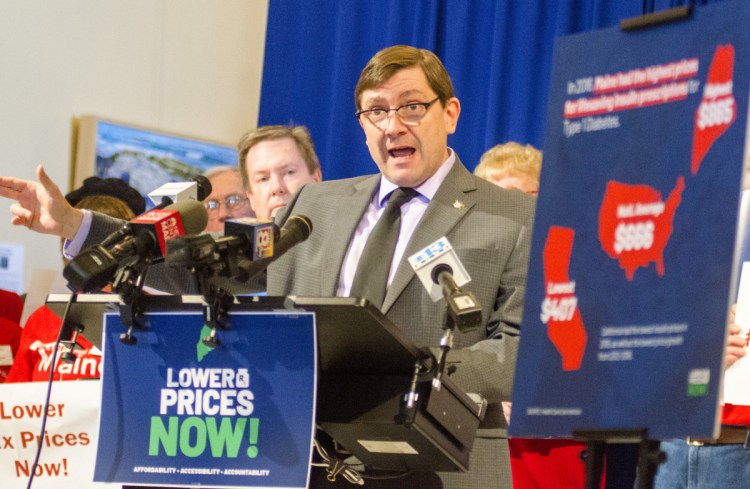Democrats in the Maine Senate unveiled a package of five bills on Tuesday that would attempt to rein in the cost of prescription drugs, including a proposal to create a state commission to regulate drug payments.
The other bills would allow bulk importation of medications from Canada, regulate pharmacy benefit managers – the middlemen who can exclude certain medications from insurance plans – create more transparency in drug prices, and permit individuals to import drugs from Canada.
The bills follow what some other states have done, including Vermont, which last year approved the bulk importation bill, and Maryland, which has a bill pending that would create a similar oversight commission.
“One piece of legislation cannot solve the prescription drug crisis,” Senate President Troy Jackson, D-Allagash, said in a statement. “But by passing a thoughtful and comprehensive prescription drug reform package, Maine can provide some relief to the people of this state and be a leader on this issue for the rest of the country.”
HOW U.S. COMPARES
The United States has higher prescription drug prices than nine other developed nations, including Canada, Australia, Norway and the United Kingdom, according to a 2016 survey by the Commonwealth Fund. Drug prices on average increased 29 percent from 2012 to 2017, according to the Pew Charitable Trusts. In one example that attracted criticism, life-saving allergy antidote EpiPen increased in price from about $100 in 2009 to $600 in 2016 for a two-pack of the injectors, according to news reports.

Kate Brogan of Portland talks about the expense of insulin for her son during Tuesday’s news conference about high prices of prescription drugs. “The pharmaceutical industry can’t be allowed to continue to make these obscene profits on the backs of families like mine,” Brogan said. Joe Phelan/Kennebec Journal
One bill would establish a Prescription Drug Affordability Board to set payment rates that “would apply to purchasers throughout the healthcare system” and require drug manufacturers to justify drug prices if the medications are determined to be “excessively expensive.”
The board would be similar to a public utilities commission, except that its jurisdiction would be prescription drugs.
Another bill would permit designated wholesalers to purchase drugs from Canada.
Vermont’s first-in-the-nation drug importation law still needs a waiver from the federal government that would allow its law to be implemented. Alex Azar, health and human services commissioner under President Trump, recently said that importing medications from Canada would be under consideration.
Kate Brogan of Portland said her 5-year-old son, Nathan, has diabetes, and his insulin drug, Humalog, has increased in price 35 times since 1996, rising from $21 per month to $300. Brogan said the same drug costs about $30 monthly in Canada. Every year, she hits her out-of-pocket maximum of about $7,000 paying for medications and medical supplies for diabetics.
“The pharmaceutical industry can’t be allowed to continue to make these obscene profits on the backs of families like mine, who have no choice but to pay these outrageous prices for drugs we need to keep our loved ones alive,” Brogan said.
NATIONAL MOVES AFOOT
The issue has gained traction recently among Democratic and Republican politicians.
Maine Rep. Chellie Pingree, D-1st District, has sponsored a bill that would allow drug importation from Canada throughout the United States. Sen. Susan Collins, a Republican, recently introduced a bill that would prevent “harmful patent strategies that block new drugs from coming to market.” Collins also is looking at policy solutions that would promote the use of generic drugs as one idea of several under consideration.
Trump has said one of his goals is to bring down the cost of prescription drugs.
But how much the federal government will allow states to tackle the problem remains to be seen.
“We are looking for all the levers we can pull on this issue,” said Rep. Patricia Hymanson, D-York, co-chair of the Legislature’s Health and Human Services Committee. “The federal government is always saying they want states to be innovative.”
Ann Woloson, executive director of Consumers for Affordable Health Care, said the proposed prescription drug board does not run afoul of federal law, and would serve as a check against excessive drug costs. Drug companies would still be free to set their prices, but the board, in certain circumstances, would set maximum payments.
“We are not setting prices,” Woloson said.
The pharmaceutical industry has opposed measures similar to what Maine is proposing, according to the Pew Charitable Trusts.
Tiffany Haverly, public affairs director for Pharmaceutical Research and Manufacturers of America, said in a statement that they “welcome the opportunity to work with legislators to ensure that Mainers can afford their medicines and to address the ways insurers, pharmacy benefit managers and other middlemen inflate the prices patients pay at the pharmacy counter. With that said, while we are still reviewing the proposals announced today, we have concerns about any measure that would impede patients’ access to safe medications.”
Andrew MacLean, interim CEO of the Maine Medical Association, which represents doctors before the Legislature, said they haven’t had a chance to review the proposals yet.
“The Maine Medical Association has for years been concerned about the cost of prescription drugs and patient access to prescription drugs,” MacLean said. “So, we applaud the Senate Democrats’ efforts and look forward to working with them on this issue.”
Other bills proposed by Maine Democrats include regulation of pharmacy benefit managers, including requiring transparency and mandating that the managers pass along drug manufacturer rebates to consumers, and initiatives to mandate drug pricing transparency.
Joe Lawlor can be contacted at 791-6376 or at:
jlawlor@pressherald.com
Twitter: joelawlorph
Send questions/comments to the editors.




Comments are no longer available on this story